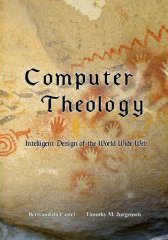PRESS
COMPUTER THEOLOGY |
||||
|
single differential
identity. Thus, we would suggest that the mark is a credential: it has the
characteristics of a generic theater ticket, not of an identification card.
While not a ticket that a devout Christian would seek to hold, in fact it has
relatively little in common with a secure core or with a transcendent personal
device for that matter. As a Radio-Frequency Identification (RFID) Token, the
only information that it would convey is “Admit One to the
In The
SpyChips Threat, Katherine Albrecht and Liz McIntyre consider RFID tokens
attached to goods on one hand, and RFID tokens potentially (in a few cases so
far) inserted under the skin of humans. They warn that RFID tokens attached to
goods, say in a supermarket, may stay attached to those goods when the purchase
is completed, therefore allowing to trace the customer thereafter, an obvious
invasion of privacy. Concerning RFID inserted under the skin, they warn,
equally correctly, of the possibility to make them equivalent to tattooing an
identity number on prisoners; again, an obvious invasion of privacy.
Furthermore, the authors equate RFID to the mark of the beast of the Book of Revelation, henceforth their
subtitle in: The SpyChips Threat: Why
Christian Should Resist RFID and Electronic Surveillance. We do not think
that this association with the mark of the beast is warranted, as we explained
earlier that the latter is not a differential identity index of the marquee.
However, it should be clear to our readers that we consider that the use of RFID
outside of their purview, e.g. outside of the inventory system of a
supermarket, is not acceptable. In particular, using and implanted RFID, if it
allows associating a differential identity with an experiential identity, is
even more condemnable. Every technology contains a possibility of misuse, but
the transcendent personal device is actually intended to correct and prevent
abuses of that sort, and in fact provides means to implement the very privacy
that is otherwise threatened, as we will now see in more details. Transcendence Affected
Our perspective suggests that the human
species’ efforts toward transcendence consist primarily of effecting a
systematic and coherent environment for group and personal interactions. With
respect to computer systems and networks this need encompasses the extension of
the facilities of existing social ecosystems into cyberspace in order for
individuals to have the same possibilities for affecting the behavior of that
environment. In the extreme, this translates into the instigation of social
mutational events that serve to shape the social ecosystems in which we as
humans live. At the beginning of this chapter, we noted three such mutational
events with the inference that these paradigm transitions were the result of this
societal stimulus for transcendence. However, we must remember that the needs
of transcendence are found not just at a societal level, but in all persons,
great and small. Moreover, we suggest that these needs provide impetus through
our most complex, cognitive tools. They are profound in the degree to which
they impact the individual. It is arguable that it is through the need of
transcendence that groups evoke devotional behavior on the part of the
individual. Our rather modest goal is to suggest that we can collectively
provide similar capabilities within our computer networks and that to do so we
require a new species of computer; a species to which we ascribe the name transcendent personal device. The sating of the appetites of the individual within existing social ecosystems might be thought of as the sandbox of the transcendent personal device. As a consequence, we suggest a potential mutational shift in the manner in which individual persons interacts with their environment from a policy perspective. We can derive from current implementations of personal electronic devices some of the more basic capabilities through which such a new species of systems would offer the basis for computers and computer networks to meet this general need of the individual person. The full set of potential capabilities of the transcendent personal device is more properly derived |
||||
|
||||
© Midori Press, LLC, 2008. All rights reserved for all countries. (Inquiries) The contents of ComputerTheology: Intelligent Design of the World Wide Web are presented for the sole purpose of on-line reading to allow the reader to determine whether to purchase the book. Reproduction and other derivative works are expressly forbidden without the written consent of Midori Press. Legal deposit with the US Library of Congress 1-33735636, 2007.
|
ComputerTheology Intelligent Design of the World Wide Web Bertrand du Castel and Timothy M. Jurgensen Midori Press, Austin Texas 1st Edition 2008 (468 pp) ISBN 0-9801821-1-5 |
Book available at Midori Press (regular) |
